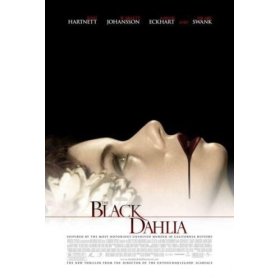The Black Dahlia - The Movie 2006 - Review

"The Black Dahlia" the last movie of Brian De Palma opened 63rd Venice Film Festival on August 30th this year. The movie opens in theatres September 15th, today. Unfortunately the critics are divided concerning the quality of the movie. They all do agree on two things, the De Palma style is recognizable threw the whole movie and the movie is about 20 minutes too long!
IMPORTANT! PLEASE BOOKMARK THIS SITE BY PRESSING CTRL+D so you can come back often! Thank you.
The movie lasts 121 minutes and is rated R. It is based on the James Ellroy 1987 novel that describes the misterious, notorious and still unsolved murder that happened in 1947 in Los Angeles. This murder still lies in the drawers of the LAPD as an unsolved case. (you can find a closer description of all the known facts related to the murder here). The victim was 22-year-old Elizabeth Short, and her naked body was found in a weedy field on the morning of January 15, 1947. It had been severed at the waist and then apparently washed before the two halves of the corpse were transported from wherever it was that Short had been murdered. Her mouth had been slashed wide into a hideous rictus, and patches of skin were missing from other areas of her body.
First we meet Lee's girlfriend, Kay Lake (Scarlett Johansson). With her clingy sweaters and satin lounging outfits, Kay is a study in retro blond lusciousness. She's a reformed prostitute, once the property of a small-time pimp whom Lee cleverly sent to prison. Now the pimp is about to be released, and Kay is scared. Her boyfriend, Mr. Fire, is obscurely incensed. And Bucky is as puzzled as we are. For one thing, although Lee and Kay live together, Kay pointedly tells Bucky that they don't sleep together. (This intriguing wisp of information is never pursued, and never pays off.) Before long, the three of them become inseparable. They hang out around the house a lot, smoking and drinking and smoking some more, and when they go out to the movies, Kay sits between the two men and holds hands with both of them. This, too, remains unexplained, and leads nowhere.
The Black Dahlia appears at last in one of the movie's several stylishly-constructed set-piece scenes — a crane shot that pans up from one street and across a rooftop to another street nearby, where, from high above, we see the body lying in the field. Given that the director is De Palma, the man who made the 1983 "Scarface" (if he had a boxing handle, it might be "Mr. Bloodbath"), you'd expect him to dive right down into this ghastly crime scene. But De Palma is oddly (and admirably) fastidious; he never pushes Elizabeth Short's mutilated corpse entirely into our faces.

He does indulge his penchant for lurid kink, though, and he has a lot of fun doing it. The fictitious porn film in which Elizabeth features (she's played by Mia Kirshner) is rendered with a bold, knowing prurience. And when the murder investigation takes Bucky to a plush lesbian nightclub, it's a place so fabulously dissolute that the tuxedoed figure up onstage singing "Love for Sale," amid a bevy of writhing, tongue-kissing chorines, turns out to be k.d. lang.
We have plenty of time to savor these titillating details, because the plot has left us far behind. There's a slumming rich girl named Madeleine (Hilary Swank), who's said to be a dead ringer for Elizabeth Short. (Unfortunately, Swank looks nothing like Mia Kirshner; she doesn't even much resemble Hilary Swank.) And there's her dreadful family: a moneybags dad (John Kavanagh) who admires Hitler, a pointlessly weird little sister (Rachel Miner) and a drunken, gibbering mother (Fiona Shaw, in the movie's one appallingly misconceived performance). There's also a brazenly ridiculous, sub-"Chinatown" plot element involving a conspiracy to misuse rotten lumber from old silent-movie sets. But the picture's crowning lunacy comes at the end, when the Dahlia's killer is "revealed" in an extended sequence of such demented, squealing hysteria, we want to avert our eyes in embarrassment for the actors.
Much of the critics puts an accent of the contemporaneity of the actors against the time and spirit they are suppose to depict. Also, too much of "The Black Dahlia" consists of narrated information; about half the movie is synopsis of what the filmmakers don't have time to dramatize. And despite genius-level contributions from cinematographer Vilmos Zsigmond and art director Dante Ferretti, the handsome film is almost abusively murky, trafficking in difficult-to-follow plot manipulations, arbitrary twists and mumbled dialogue. It ultimately comes to rely on one of those by-now de rigueur 10-minute final synopses that shuffle through the story a second time, revealing the secret connections behind seemingly unrelated events.
IMPORTANT! PLEASE BOOKMARK THIS SITE BY PRESSING CTRL+D so you can come back often! Thank you.
All in all it is good to see a De Palma movie again. But hopefully the next one will be a better movie.
0 Comments:
Post a Comment
<< Home